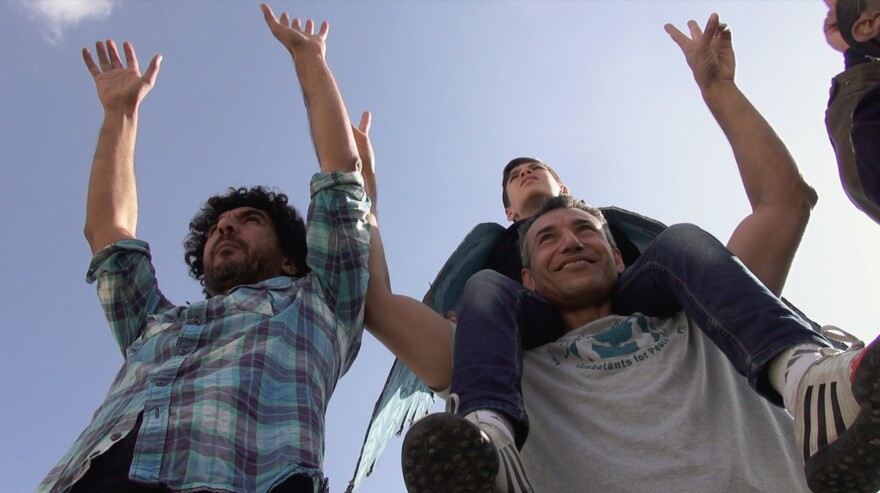When Kansas Citian Mike Lundgren saw the film Disturbing the Peace, about the Israeli-Palestinian conflict, he knew he wanted to screen it in Kansas City. As curator of TEDxKC, he thought the film would fit into his interest in trying to offer people a new look at old issues.
"It's bringing in alternative points of view or fresh perspectives — something that has the ability to snap you up a little bit: Wait a second, I never thought of it that way," Lundgren says.
Disturbing the Peace follows several former Palestinian and Israeli combatants. New York-based filmmakers Stephen Apkon and Marcina Hale structure the story through segments of interviews with each, paired with dramatic reenactments of their experiences in the conflict.
Initially, the participants talk about their hatred of the “enemy,” explaining the violent acts they committed and the anger they felt. As the film progresses, each person realizes that violence against the other side will never result in peace — but, getting to know each other might.
The one-time enemies formed a group called Combatants for Peace, and two of them will be in Kansas City for discussions around a screening of the film next week.
Apkon says he was in the Middle East four years ago trying to determine whether he could make a film that said anything new about the conflict. The answer seemed to be no.
Then, through mutual acquaintances, Apkon met the Combatants for Peace. At their first meeting, he asked Chen Alon, one of the members who will visit Kansas City, what Combatants for Peace was really about.
“Without losing a beat he said, ‘We’re a community of people taking responsibility for our own creation.’ They’re the only group of enemy combatants working together through nonviolence during an ongoing armed conflict in the world. I thought, this is really both compelling in terms of what’s going on over there, but also speaks to universal themes that are relevant to all of us,” Apkon says.

Admiring the way the combatants had found the “freedom of standing together with no sense of fear and a great sense of what is possible,” Apkon started filming.
“What I’ve seen is that (the combatants) experience a level of freedom that very few of us get to know," he says. "They’re beyond those stories that create the ‘other’ and create a sense of separation.”
Lundgren says the film “teaches us a new way to think about conflict” — a way we might not reach without exposure to and conversation with the other “side.”
He says watching the combatants' thought progression shines a light on biases in our everyday lives. Once we realize we are holding onto a negative viewpoint for no valid reason, he says, “it’s a chance to drop the narrative that no longer really serves you. It may feel like it’s serving you, because ‘I’m mad’ and ‘We have to stop this!’ but the narrative keeps us from actually making any progress.”
If Palestinians and Israelis can do it, surely neighbors in Kansas City can as well.
Apkon and Hale are calling a week of scheduled panel discussions, workshops and other events “impactivations” — an effort, Apkon says, to activate people "to think about how to utilize these concepts and models for creating conversations within their community.”
Apkon recognized the wider applications of the film immediately, but, he says “we could never have anticipated when we started this project that it would be coming out at a time when it would be so relevant and resonant to our own country.”
Though the film has been screened and discussed all over Palestine and Israel, and has debuted in New York and Los Angeles and won several awards, Kansas City will be the first place to test the idea of impactivations, thanks, in part, to Lundgren.
While each city brings unique conflicts to the post-screening panel discussions, Apkon says all people everywhere want the same end results: “To create a compassionate world, to have a sense of freedom and dignity and security, to be seen and to see the other and to bridge those divides in ourselves and in our communities.”
In the 11 years since Combatants for Peace was founded, it has grown to eight active groups plus an exclusively women’s group in the Middle East. Apkon says the Combatants pay a price for their involvement because they’re bucking the norm — the film shows their fellow citizens calling them traitors — but they don’t focus on the negative.
He’s hopeful not only for the Middle East, but for our nation, saying the election of Donald Trump did not create a divide but revealed it.
“I realized that the greatest obstacle to peace or to bridging these divides is not extremists in our communities and it’s not our political leaders. The greatest obstacle is almost apathy. We care, and we see each other’s humanity. We want to move past these challenges, but then we go on about our lives.
Disturbing the Peace film screening, 7 p.m., Tuesday, Feb. 7, Kauffman Center for the Performing Arts, 1601 Broadway, Kansas City, Missouri, 64108, 816-994-7222. Combatants for Peace panel discussion, 1:30-2:45 Thursday, February 9, at the World War I Museum and Memorial, 2 Memorial Drive, Kansas City, Missouri, 64108.
Anne Kniggendorf’s writing appears regularly in The Kansas City Star and Ink magazine. Follow her @annekniggendorf.





